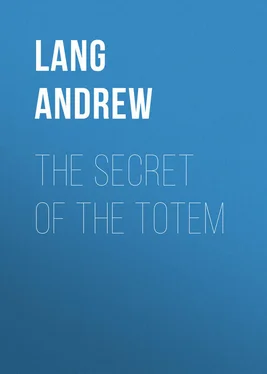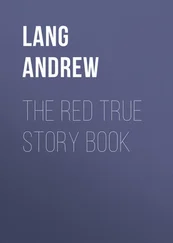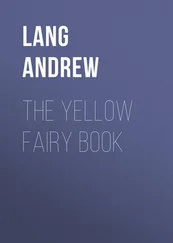Andrew Lang - The Secret of the Totem
Здесь есть возможность читать онлайн «Andrew Lang - The Secret of the Totem» — ознакомительный отрывок электронной книги совершенно бесплатно, а после прочтения отрывка купить полную версию. В некоторых случаях можно слушать аудио, скачать через торрент в формате fb2 и присутствует краткое содержание. Жанр: foreign_antique, foreign_prose, на английском языке. Описание произведения, (предисловие) а так же отзывы посетителей доступны на портале библиотеки ЛибКат.
- Название:The Secret of the Totem
- Автор:
- Жанр:
- Год:неизвестен
- ISBN:нет данных
- Рейтинг книги:4 / 5. Голосов: 1
-
Избранное:Добавить в избранное
- Отзывы:
-
Ваша оценка:
- 80
- 1
- 2
- 3
- 4
- 5
The Secret of the Totem: краткое содержание, описание и аннотация
Предлагаем к чтению аннотацию, описание, краткое содержание или предисловие (зависит от того, что написал сам автор книги «The Secret of the Totem»). Если вы не нашли необходимую информацию о книге — напишите в комментариях, мы постараемся отыскать её.
The Secret of the Totem — читать онлайн ознакомительный отрывок
Ниже представлен текст книги, разбитый по страницам. Система сохранения места последней прочитанной страницы, позволяет с удобством читать онлайн бесплатно книгу «The Secret of the Totem», без необходимости каждый раз заново искать на чём Вы остановились. Поставьте закладку, и сможете в любой момент перейти на страницу, на которой закончили чтение.
Интервал:
Закладка:
Mr. Howitt says, in his earlier account of this institution, that among the Dieri, neighbours of the Urabunna, the men and women who are made Pirauru are not consulted. The heads of the tribe do not ask whether they fancy each other or not. "The time is one of festivity, feasting, and amusement," only too obviously! "Dancing is carried on." "A man can always exercise marital rights towards his Pirauru , if they meet when her Noa (real husband) is absent, but he cannot take her away from him unless by his consent," except at the feasts. But the husband usually consents. "In spite of all this arrangement, most of the quarrels among the Dieri arise out of this Pirauru practice… "A son or daughter regards the real husband ( Noa ) of his mother as his Apiri Muria , or "real father"; his mother's Pirauru is only his Apiri Waka , or "little father." At certain feasts of license, such as intertribal marriages, "no jealous feeling is allowed under penalty of strangling, but it crops up afterwards, and occasions many bloody affrays." 50 50 J. A. I. , pp. 56-60, August 1890.
Thus jealousy is not easily kept in abeyance by customary law.
The idea of such a change of partners is human, not animal, and the more of a brute the ancestor of man was the less could he dream, in times truly primitive, of Piraungaru as a permanent arrangement. Men, in a few tribes, declined into it, and are capable of passing out of it, like the Urabunna or Dieri man, who either retains so much of the animal, or is rising so far towards the Homeric standard, as to fight rather than let his wife be allotted to another man, or at least to thump that other man afterwards.
The Dieri case of the feast of license, just mentioned, is notable. "The various Piraurus (paramours) are allotted to each other by the great council of the tribe, after which their names are formally announced to the assembled people on the evening of the ceremony of circumcision, during which there is for a time a general license permitted between all those who have been thus allotted to each other." But persons of the same totem among the Dieri may not be Piraurus to each other, nor may near relations as we reckon kinship, including cousins on both sides.
In this arrangement Mr. Howitt sees "a form of group marriage," while I see tribe-regulated license, certainly much less lawless than that of the more advanced Fijians or the Arunta. Mr. Howitt did not state that the Pirauru or Piraungaru unions are preceded (as marriage is) by any ceremony, unless the reading the banns, so to speak, by public proclamation among the Dieri is a ceremony. 51 51 Howitt, J. A. I. , August 1890, pp. 55-58.
Now he has discovered a ceremony as symbolic as our wedding ring (1904).
Little light, if any, is thrown on these customs of legalised license by philology. Mr. Howitt thought that Pirauru may be derived from Pira , "the moon," and Uru , "circular." The tribal feasts of license are held at the full moon, but I am not aware that, by the natives, people are deemed peculiarly "moonstruck," or lunatic, at that season. If Urabunna Piraungaru is linguistically connected with Dieri Pirauru , then both Piraungaru and Pirauru may mean "Full Mooners." "Thy full moons and thy festivals are an abomination to me!" 52 52 What the Dieri call Pirauru (legalised paramour) the adjacent Kunan-daburi tribe call Dilpa Mali . In this tribe the individual husband or individual wife (that is, the real wife or husband) is styled Nubaia , in Dieri Noa , in Urabunna Nupa . Husband's brother, sister's husband, wife's sister, and brother's wife are all Nubaia Kodimali in Kunandabori, and are all Noa in Dieri. What Dilpa Mali (legalised paramour, or "accessory wife or husband") means in Kunandabori Mr. Howitt does not know. But he learns that Kodi Mali (applied to Pirauru ) means " not Nubaia," that is, " not legal individual husband or wife." If we knew what Dilpa means in Dilpa Mali (legalised paramour of either sex), we should know more than we are apt to do in the present state of Australian philology. At Port Lincoln a man calls his own wife Yung Ara , that of his brother Karteti ( Trans. Phil. Soc. Vic. , v. 180). What do these words mean? — Report of Regents of Smithsonian Institute , 1883, pp. 804-806.
Among the Dieri, "a woman becomes the Noa of a man most frequently by being betrothed to him when she is a mere infant… In certain cases she is given by the Great Council, as a reward for some meritorious act on his part." "None but the brave deserve the fair," and this is "individual marriage," though the woman who is wedded to one man may be legally allotted as Full Mooner, or Pirauru , to several. "The right of the Noa overrides that of the Pirauru . Thus a man cannot claim a woman who is Pirauru to him when her Noa is present in the camp, excepting by his consent." The husband generally yields, he shares equivalent privileges. "Such cases, however, are the frequent causes of jealousies and fights." 53 53 Report of Regents of Smithsonian Institute , 1883, p. 807.
This evidence does not seem, on the whole, to force upon us the conclusion that the Urabunna Piraungaru custom, or any of these customs, any more than the custom of polyandry, or of legalised incest in higher societies, is a survival of "group marriage" – all men of certain social grades being actual husbands of all women of the corresponding grades – while again that is a survival of gradeless promiscuity. We shall disprove that theory. Rather, the Piraungaru custom appears to be a limited concession to the taste, certainly a human taste, for partner-changing — which can only manifest itself where regular partnerships already exist . Jealousy among these tribes is in a state of modified abeyance: like nature herself, and second nature, where, among civilised peoples, things unnatural, or contrary to the horror of incest, have been systematically legalised.
I have so far given Mr. Howitt's account of Pirrauru (the name is now so written by him) among the Dieri, as it appeared in his works, prior to 1904. In that year he published his Native Tribes of South-East Australia , which contains additional details of essential importance (pp. 179-187). A woman becomes Tippa Malku , 54 54 Tippa , in one tongue, Malku in another, denote the tassel which is a man's full dress suit.
or affianced, 55 55 Mr. Howitt says that the pair are Tippa Malku "for the time being" (p. 179), though the association seems to be permanent. May girls Tippa Malku – "sealed" to a man – have relations with other men before their actual marriage, and with what men? We are not told, but a girl cannot be a Pirrauru before she is Tippa Malku . If Pirrauru "arises through the exchange by brothers of their wives " (p. 181), how can an unmarried man who has no wife become a Pirrauru ? He does. When Pirrauru people are "re-allotted" (p. 182), does the old connection persist, or is it broken, or is it merely in being for the festive occasion? How does the jealousy of the Pirrauru , which is great, like the change? These questions, and many more, are asked by Mr. N. W. Thomas.
to one man only, before she becomes Pirrauru , or what Mr. Howitt calls a "group wife." A "group wife," I think, no woman becomes. She is never the Pirrauru of all the men who are Noa to her, that is, intermarriageable with her. She is merely later allotted, after a symbolic ceremony, as a Pirrauru to one or more men, who are Noa to her. At first, while a child, or at least while a maiden, she is betrothed (there are varieties of modes) to one individual male. She may ask her husband to let her take on another man as Pirrauru ; "should he refuse to do this she must put up with it." If he consents, other men make two adjacent ridges of sand, and level them into one larger ridge, while a man, usually the selected lover, pours sand from the ridge over the upper part of his thighs, "buries the Pirrauru in the sand." (The phrase does not suggest that Pirrauru means "Full Mooners.") This is the Kandri ceremony, it is performed when men swop wives (exchange their Noa as Pirraurus ), and also when "the whole of the marriageable or married people, even those who are already Pirrauru , are reallotted ," a term which suggests the temporary character of the unions.
Интервал:
Закладка:
Похожие книги на «The Secret of the Totem»
Представляем Вашему вниманию похожие книги на «The Secret of the Totem» списком для выбора. Мы отобрали схожую по названию и смыслу литературу в надежде предоставить читателям больше вариантов отыскать новые, интересные, ещё непрочитанные произведения.
Обсуждение, отзывы о книге «The Secret of the Totem» и просто собственные мнения читателей. Оставьте ваши комментарии, напишите, что Вы думаете о произведении, его смысле или главных героях. Укажите что конкретно понравилось, а что нет, и почему Вы так считаете.












